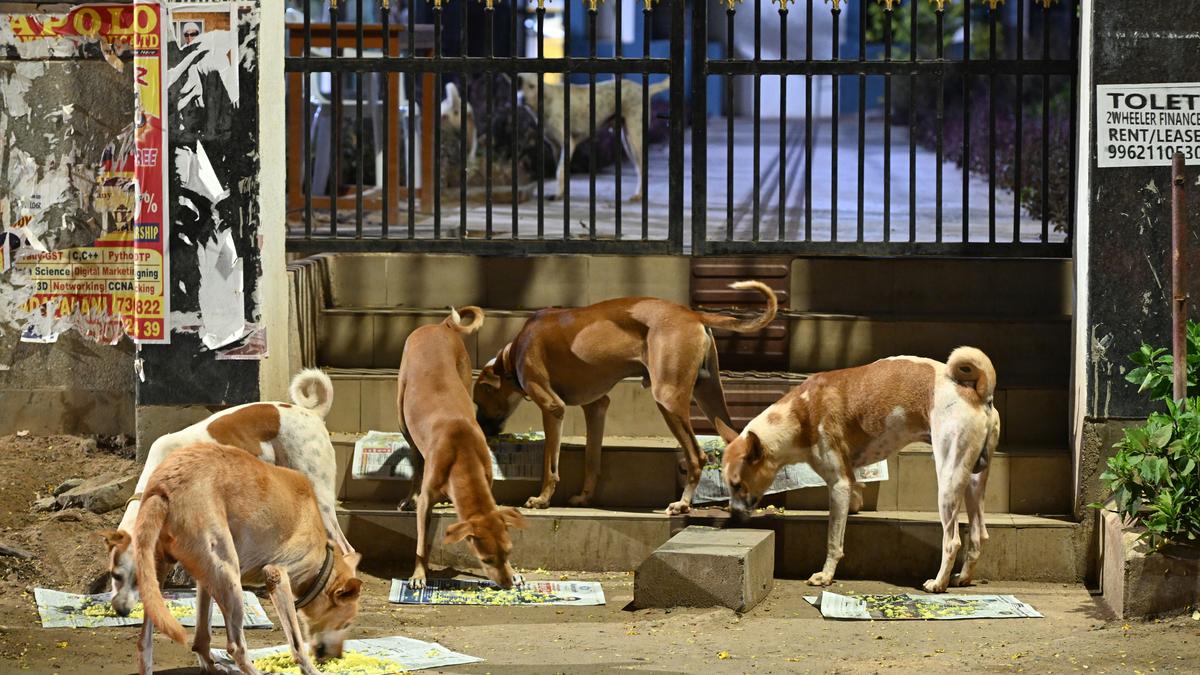
Man vs Dog: twisted tales of an abiding companionship
The Hindu
Understanding the complex relationship between humans and dogs, exploring risks, and solutions for peaceful coexistence in public spaces.
A favourite among pets, dogs have been an integral part of our landscape. Although the co-existence of humans and dogs span millennia, sporadic incidents of conflict — such as the more recent attack by two Rottweilers on a five-year-old kid in a public park and according to multiple accounts, a rabid street dog biting nearly 29 people in a gated community in Chennai — have strained the tolerance, prompting a holistic look at risks and negative interactions with dogs in public space.
There are multiple problems — a family with a pet dog was turned down half-a-dozen times before it could find a rental house, a jogger is always on alert and looking over his shoulder during an early morning jog, an IT employee takes a longer route to avoid dogs while walking home from the bus stop. Srinivasan, a resident of T. Nagar, Chennai, says dogs on his street keep barking through the night, which makes sleeping very difficult. V.S. Jayaraman, a member of the T. Nagar Residents’ Welfare Association, complains that walking in parks has become a challenge because people feel threatened by stray dogs. This has impacted senior citizens who come for morning and evening walks, he adds.
Residents regularly move the civic bodies for removing the dogs. However, this is not something local bodies are legally allowed to do. While problems around dogs have been long-standing, what exactly has queered the pitch? Krithika Srinivasan, animal studies researcher and senior lecturer in the School of Geosciences at the University of Edinburgh, says it is crucial to differentiate between perceived risks and actual material risks. “You can have situations where the material risk remains the same, and the apprehension goes up or comes down, or vice versa,” she says.
Ms. Krithika, who is also the head of Remaking One Health-Indies, a project exploring everyday people-dog relations and why rabies continues to be a public health concern, suggests that one of the reasons for increased apprehension could be the way information flows, especially on social media, in which ‘newsworthy’ events and the ones that get circulated more tend to be negative, as opposed to positive news. “There is also a normative shift in what is ‘acceptable’ behaviour. A while ago, dogs barking would have been similar to a car pulling by or a bunch of people shouting — something that happens and then stops. How it becomes an annoyance, something that needs to be complained about, is interesting,” she says.
As part of a three-month study done for the Greater Chennai Corporation (GCC) on complaints related to dogs in 2023, Ms. Krithika says the average number of complaints received was not significant when seen in relation to the number of people, dogs, and the geographical scale of the city. One of the most common complaints being loud barking at night, and it is often the result of territorial confrontation among dogs. “Dogs being territorial is a good thing from a health point of view, if they are vaccinated. If the population is stable and the dogs are neutered, it keeps other dogs away,” she says.
Here’s where the trouble, as far as Tamil Nadu is concerned, kicks in. The approach adopted for vaccination and sterilisation of street or community dogs has been haphazard so far in Chennai. In November 2023, the long-pending sterilisation drive that began was cut short by the rain and cyclone the following month. It is yet to begin in a full-fledged manner. Since 2021, 15,000 dogs are said to have been vaccinated and sterilised.
According to Abi T. Vanak, an authority on the ecology of dogs and Director of the Centre for Policy Design, Ashoka Trust for Research in Ecology and Environment, the current method is unscientific. Instead, the local body has to count the dogs, set a realistic target for population reduction, and calculate how many in a particular area have to be sterilised to get to the target.

With over 120 interactive stalls representing CHRIST campuses across Bengaluru, Delhi-NCR, and Pune-Lavasa, the event provided valuable insights into undergraduate, postgraduate, and Ph.D. programmes. Participants also benefited from personalised career counselling sessions designed to guide their educational and career choices.










